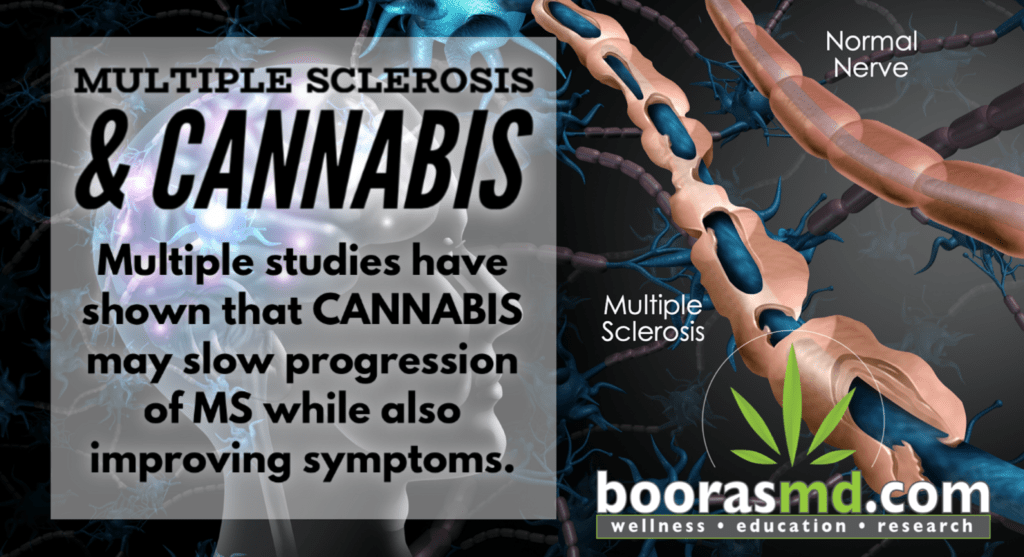Multiple Sclerosis (MS) and Medical Marijuana (Cannabis)
Summary: MS is one of the core certifying conditions qualifying one for treatment with Medical Cannabis. This means that evidence shows clear benefits from using medical cannabis.
Multiple sclerosis is a chronic neurodegenerative disease of the central nervous system resulting in muscular weakness, nerve pain and a loss of motor coordination. It is likely triggered by an inflammatory attack on the central nervous system, called Excitotoxicity. This occurs from pathologically high levels of otherwise safe chemicals, such as Glutamate, which is the most abundant excitatory neurotransmitter in our nervous system. Abnormally high Glutamate levels can result in nerve damage or death due to the excessive stimulation of receptors. Medical Grade Cannabis helps control Excitotoxicity.
https://boorasmd.com/education/excitotoxicity-and-cannabis/
Over time, MS patients typically become disabled and, in some cases, the disease can be fatal. According to the US National Multiple Sclerosis Society, about 200 people are diagnosed every week with the disease, usually between 20 to 40 years of age.
Multiple studies have shown improvements in multiple symptoms of multiple sclerosis associated with cannabinoid use.
Other models suggest that medical cannabis treatment “may also inhibit MS progression in addition to providing symptom management”.
https://norml.org/marijuana/library/recent-medical-marijuana-research/multiple-sclerosis/
“Cannabis may also slow the neurodegenerative processes that ultimately lead to chronic disability in MS and other neurodegenerative disorders”.
https://academic.oup.com/brain/article/126/10/2191/314489
A 2004 study in 160 patients show definite improvements in pain, spasticity, bladder problems and tremor.
“
Do cannabis-based medicinal extracts have general or specific effects on symptoms in multiple sclerosis?”
A double-blind, randomized, placebo-controlled study on 160 patients.
https://pubmed.ncbi.nlm.nih.gov/15327042/
Overactive bladder is a common development in people with multiple sclerosis and other neurodegenerative disorders. The bladder and its surrounding layers contain both CB1 and CB2 cannabinoid receptors. A review of three studies showed that incontinence episodes more diminished. Side effects in the cannabis treatment arms Worth out to be mailed and less than side effects associated with traditional pharmacotherapy using Myrbetric or antimuscarinics (like Detrol).
https://www.projectcbd.org/cannabis-and-incontinence
Additional references:
“Cannabinoids for treating neurogenic lower urinary tract dysfunction in patients with multiple sclerosis: a systematic review and meta‐analysis”.
https://bjui-journals.onlinelibrary.wiley.com/doi/full/10.1111/bju.13759
“Cannabis use in people with Parkinson’s disease and Multiple Sclerosis: A web-based investigation”.
https://pubmed.ncbi.nlm.nih.gov/28735833/
“Meta-analysis of cannabis based treatments for neuropathic and multiple sclerosis-related pain”.
Debilitating pain occurs in 50-70% of people with multiple sclerosis. https://pubmed.ncbi.nlm.nih.gov/17257464/
Written by Dr. Charlie Booras, M.D. on September 8, 2020.
Updated on March 6, 2021.



